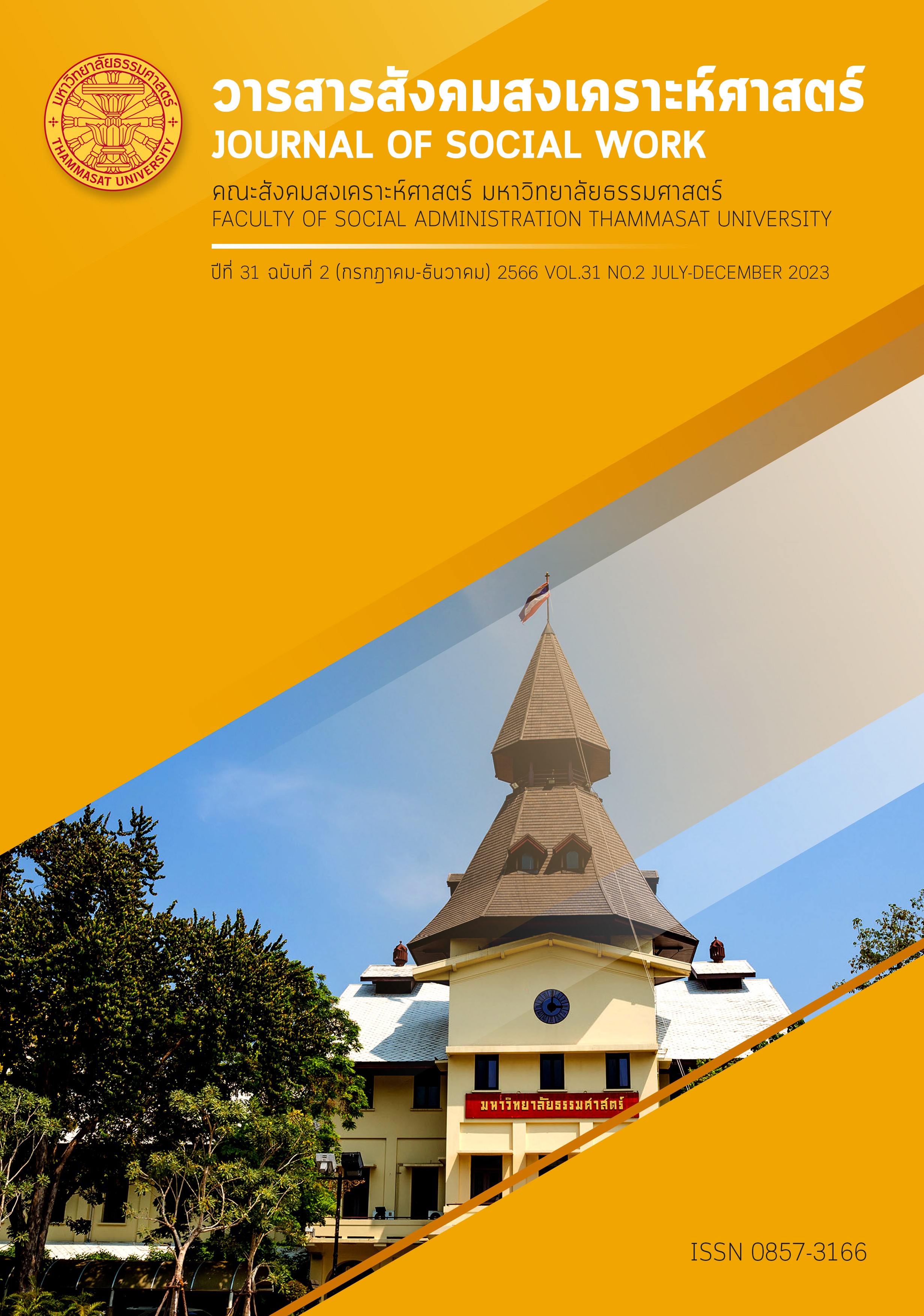The Reduction of Violence in Thai Society by International Standards: RESPECT for Women's Equality
Keywords:
Violence, Crime, RespectAbstract
This study, entitled "The Reduction of Violence in Thai Society to Align With International Standards: Respect for Women's Equality" has several objectives: to investigate the problems, causes, and effects of violence in Thai society, to study the implementation of the international standard Violence Reduction Guidelines: Respect for Women's Equality (RESPECT) in collaboration with relevant agencies appropriate for the Thai social context and to suggest guidelines for preventing and resolving problems of violence in order to integrate international standards for reducing violence within the Thai social context.
The research methodology consists of mixed research including documentary research, quantitative and qualitative research, and participatory action research. The sample group consisted of 2,400 people, 400 inmates, and a unit for the prevention and solution of violence in Ko Kha Subdistrict Municipality, Ko Kha District, Lampang Province. The quantitative research analyzed the 0data using percentage, mean and standard deviation statistics. For qualitative research, content analysis was used.
The study found that in 2021, Thailand was the 47th most violent country in the world. Major problems of violence in Thai society during the COVID-19 situation include suicide, family violence, violence against children and women, violence against children and young people, and the use of violence by children and adolescents. The main causes of violence are economic problems, mental health problems, values, and norms related to violence, alcohol, drugs, and firearms problems, with the impact of damage from violence accounting for 4 percent of Thailand's Gross Domestic Product. Violence reduction according to international standards and applied to the context of Thai society requires public relations to raise awareness and advance the RESPECT approach to women's equality, based on the World Health Organization and United Nations standards on reducing violence against women, in collaboration with key actors and representatives of relevant agencies and drive to reduce violence in Ko Kha Subdistrict Municipality, Ko Kha District, Lampang Province.
Research recommendations include the urgent policy formulation of a national agenda for reducing violence, the implementation of policies and measures to address violence against women according to the Respect for Women's Equality Guidelines (RESPECT), and the promotion of best practice or model areas for reducing violence in society and applying the Respect for Women's Equality (RESPECT) guidelines to reduce other forms of violence in Thai society.
References
กรมกิจการสตรีและสถาบันครอบครัว. (2564). สถิติความรุนแรงในครอบครัวทั่วประเทศ ระหว่าง พ.ศ.2564. สืบค้นเมื่อวันที่ 20 เมษายน 2566, nesdc. https://opendata.nesdc.go.th/dataset/https-drive-google-com-file-d-16qsyunvqmzxnm4krc_5xee_zoxffxmg4-view-usp-sharing
กรมสุขภาพจิต. (2561). สสส.รณรงค์ไม่ทำร้ายผู้หญิง หลังพบผู้หญิงถูกทำร้าย 7 คน/วัน. สืบค้นเมื่อวันที่ 20 เมษายน 2566, https://dmh.go.th/ news-dmh/view.asp?id=28308
กระทรวงพัฒนาสังคมและความมั่นคงของมนุษย์. (2563). ปลัด พม. เปิดโครงการรณรงค์ยุติความรุนแรงต่อเด็กและสตรี พร้อมเสริมสร้างระบบพัฒนาครอบครัวเข้มแข็ง. สืบค้นเมื่อวันที่ 20 เมษายน 2566, https://prd.go.th/th/content/category/detail/id/39/iid/4949
ประชาชาติธุรกิจ. (2564). จะทำอย่างไร เมื่อความรุนแรงไม่ใช่เรื่องไกลตัว และบ้านไม่ใช่ Safe Zone ของทุกคน. สืบค้นเมื่อวันที่ 20 เมษายน 2566, ประชาชาติธุรกิจ https://www.prachachat.net/d-life/news-653845
พรชัย ขันตี, ธัชชัย ปิตะนีละบุตร และ อัศวิน วัฒนวิบูลย์. (2543). ทฤษฎี และงานวิจัยทางอาชญาวิทยา. กรุงเทพฯ: บุ๊คเน็ท.
สุมนทิพย์ จิตสว่าง, ฐิติยา เพชรมุนี และคณะ. (2563). รายงานวิจัยเรื่องการสร้างสังคมไทยไร้ความรุนแรง. ได้รับทุนสนับสนุนจาก สำนักงานการวิจัยแห่งชาติ (วช.) ภายใต้แผนงานวิจัยท้าทายไทย: สังคมไทยไร้ความรุนแรง (ปีที่ 1).
สุมนทิพย์ จิตสว่าง, ฐิติยา เพชรมุนี และคณะ. (2565). รายงานวิจัย เรื่อง การบูรณาการแนวทางการสร้างสังคมไทยไร้ความรุนแรงตามมาตรฐานสากลและบริบทของสังคมไทย. ได้รับทุนสนับสนุนจากสำนักงานการวิจัยแห่งชาติ (วช.) ภายใต้แผนงานวิจัยท้าทายไทย: สังคมไทยไร้ความรุนแรง (ปีที่ 2).
Etienne, G. K., Linda, L. D., James, A. M., Anthony B. Z., & Rafael L. (2002). World report on violence and health. Geneva: World Health Organization. Retrieved from https://apps.who.int/iris/ bitstream/handle/10665/42495/9241545615_eng.pdf
Institute for Economics, & Peace. (2021). Global Peace Index 2021: Measuring Peace in a Complex World. Sydney. Retrieved from https://www.visionofhumanity.org/wp-content/uploads/2021/06/GPI-2021-web-1.pdf
Krug, E. G., Dahlberg, L. L., Mercy, J. A., Zwi, A. B., Lozano, R., et al. (2002). World report on violence and health. Geneva: World Health Organization. Retrieved from https://apps.who.int/iris/handle/10665/42495
UN Women. (2020). Overview: How to Use the RESPECT Framework Implementation Guide. Retrieved April 20, 2023, from https://www.unwomen.org/en/digital-library/publications/2020/07/respect-women-implementation-package
United Nations Office on Drugs and Crime. (2019). Global study for homicide. Retrieved April 20, 2023, from https://www.unodc.org/ unodc/en/data-and-analysis/global-study-on-homicide.html
World Health Organization. (2010). Violence prevention: the evidence. Geneva: World Health Organization. Retrieved from https://apps.who.int/iris/handle/10665/77936
worldpopulationreview.com. (2020). Most Violent Countries 2022. Retrieved April 20, 2023, from https://worldpopulationreview.com/ country-rankings/most-violent-countries
worldpopulationreview.com. (2021). Rape Statistics by Country 2021. Retrieved April 20, 2023, from https://worldpopulationreview. com/country-rankings/rape-statistics-by-country
worldpopulationreview.com. (2021). Crime Rate by Country 2022. Retrieved April 20, 2023, from https://worldpopulationreview. com/country-rankings/crime-rate-by-country
Downloads
Published
How to Cite
Issue
Section
License
Copyright (c) 2023 Journal of Social Work

This work is licensed under a Creative Commons Attribution-NonCommercial-NoDerivatives 4.0 International License.
The manuscripts published in the Social Work Journal is the copyright of the Social Work Journal, Thammasat University
Any article or opinion appeared in the Social Work Journal will solely be under the responsibility of the author The Faculty of Social Administration, Thammasat University and the editors do not need to reach in agreement or hold any responsibility.



